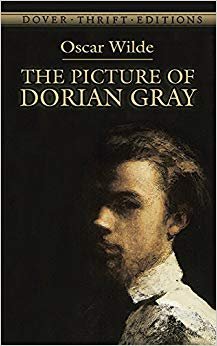
When reading this book it's difficult to decide what exactly Oscar Wilde was trying to accomplish. Is this a treatise on the dichotomy between virtuous living and hedonism? A discourse on the advantages of the Decadent lifestyle? The vaguely supernatural tale of a young man's descent into sin, vice, and perversion? When first reading this piece, I came in expecting the latter of the three, and ended up finding the former two instead. Granted, the latter is there, but it tends to get lost in the discourse of Henry Wotton. This is something that I believe does not work about the piece, in that its focus is too much on Henry Wotton's ramblings about hedonist philosophy rather than the title character and his immoral descent.
To begin, the title character is only spoken of in the first chapter, but never properly introduced until the second. The bulk of the first chapter is devoted to the debate between Basil and Henry Wotton, the character who is described first and the first to speak in the novel, trademarks which would usually mark a character as the primary protagonist. In fact, it is Henry that does the majority of speaking throughout the piece, with large blocks of uninterrupted text devoted to his speeches, often with other characters being present seeming only to be there to provide counterpoint to spark off another argument, or simply to generally nod and agree and be a sounding board. While his speeches and “guidance” are what primarily begins Dorian on his descent, there seems to be too much focus on the cause for descent rather than the descent itself.
Much of Dorian's descent into depravity is told, rather than shown. There are long blocks of text that describe him reading a book that perverts him more, or rumours of him shuffling off to some bordello or opium den, but there is little to show his growing cruelty, other than the first incident where he ends his relationship with the actress, who later commits suicide. If the piece is to be about the step-by-step descent, the details of the painting of him which degrades with every sin and passing year, then it is my opinion that the descent should actually be shown. Let the author write the scene where Dorian visits the opium den for the first time. Let the reader see Dorian's corruption of so many of the upstanding young gentlemen into rakes, alcoholics, and drug addicts. If hedonism is to be seductive to Dorian, let the reader be intially seduced as well, before treading on to see the horrifying effects it has on Dorian's soul, and then even further terrified by Dorian's indifference or even his fascination with it as it is shown in later chapters. I believe that any of this would serve the reader and the story better than simply flashing forward a few decades and giving a long paragraph to catch the reader up.
What I took from this story was the importance of action, to break up long blocks of text so that they do not become too monotonous. If there is going to be discourse, it must organically fit into the story, lest it feel like padding, or worse yet, that the story is merely a frame for nigh-endless blocks of discourse on a philosophy that could become dated.
Posted from my blog with SteemPress : https://vaughndemont.com/2018/07/28/the-picture-of-dorian-gray-saturday-book-club/